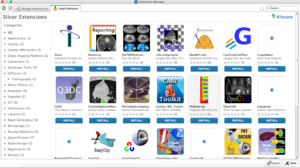Documentation/Nightly/Extensions
From Slicer Wiki
Revision as of 22:21, 20 February 2013 by JChris.FillionR (talk | contribs)
Home < Documentation < Nightly < Extensions

Extensions by Category
Cat 1
Cat 2
- SkullStripper (Xiaodong Tao)
- CARMA (Alan Morris, Salma Bengali)

- PkModeling (Emma Zhu, Jim Miller)
- FacetedVisualizer (Harini Veeraraghavan, Jim Miller)
- Reporting (Andrey Fedorov, Nicole Aucoin, Steve Pieper) (work in progress)
- SlicerRT (Csaba Pinter, Andras Lasso, Kevin Wang, Steve Pieper)
- DICOM-RT import
- Contours
- Dose volume histogram
- Dose accumulation
- Dose comparison
- Isodose line and surface display
- Modules from Plastimatch (Greg Sharp)
- VolumeResliceDriver (Junichi Tokuda, Laurent Chauvin)
- iGyne (Xiaojun Chen and iGyne Team)
- LongitudinalPETCT (Paul Mercea, Andrey Fedorov)
- DTIProcess (Francois Budin)
- DTIAtlasFiberAnalyzer (Francois Budin)
- FiberViewerLight (Francois Budin)
- DTIPrep (Francois Budin)
- DTIAtlasBuilder (Adrien Kaiser)
- TubeTK (Stephen Aylward, Jean-Christophe Fillion-Robin, Christopher Mullins, Michael Jeulin-L, Matthew McCormick)
- UKFTractography (Ryan Eckbo, Yogesh Rathi)
- TrackerStabilizer (Laurent Chauvin, Jayender Jagadeesan)
- ChangeTracker (Andrey Fedorov)
Cat 3
- LesionSegmentation (Mark Scully)
- LesionSegmentation->TrainModel (Mark Scully)
- LesionSegmentation->PredictLesions (Mark Scully)
What is an extension ?

Extensions in the Extension manager.
An extension could be seen as a delivery package bundling together one or more Slicer modules. After installing an extension, the associated modules will be presented to the user as built-in ones
The Slicer community maintains a website referred to as the Slicer Extensions Catalog to support finding, downloading and installing of extensions. Access to this website is integral to Slicer and facilitated by the Extensions Manager functionality built into the distributed program.
The Catalog classifies extensions into three levels of compliance:
- Category 1: Fully compliant Slicer Extensions: Slicer license, open source, maintained.
- Category 2: Open source, contact exists.
- Category 3: All other extensions (work in progress, beta, closed source etc).
To publish extensions, developers should consider reading the following pages: